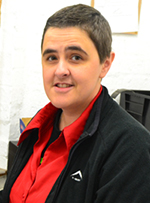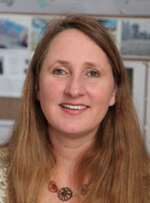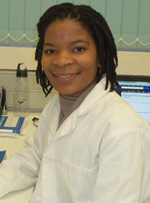Four Women in Science winners in 2014
19 August 2014 | Story by NewsroomFour UCT scientists have been recognised by the Department of Science and Technology as part of their annual Women in Science Awards.
Professor of Mechanical Engineering Genevieve Langdon was the first runner-up for the title of Distinguished Young Woman Scientist in Physical and Engineering Sciences, followed by Associate Professor Michelle Kuttel from the Department of Computer Science, in acknowledgement of their "outstanding scientific contribution to advancing and building the knowledge base in their respective disciplines". Kwezikazi Mkentane from the Department of Medicine is one of ten women under the age of 35 who have received a PhD fellowship in recognition of an "outstanding ability and potential in research" and as encouragement to remain in research, while the Centre in Information and Communication Technologies for Development's Maletsabisa Molapo is one of six to be awarded a Tata Scholarship for her doctoral research in an area "where the participation of women in traditionally low".
"Women have been sidelined in all fields and facets of life for centuries (and still are), but their exclusion from and marginalisation in education has made it more difficult for them to join the mainstream in every area," said Minister of Science and Technology Naledi Pandor in the August Mail & Guardian supplement marking the winners. "This is one of the reasons that every year in August, Women's Month, the Department of Science and Technology stages the Women in Science Awards to celebrate women by recognising and rewarding their research achievements, as well as encouraging young women to pursue science-related careers."
More about the UCT winners
 Professor Genevieve Langdon seeks to make the world a safer place through an improved understanding of structural responses to explosion loading. She conducts research on blast-resistant materials for use in structural and transportation applications, and is considered a leader in experimentation on lightweight materials and blast loading. The quality of her research in the area of experimental mechanics has garnered international recognition as well as numerous research grants.
Professor Genevieve Langdon seeks to make the world a safer place through an improved understanding of structural responses to explosion loading. She conducts research on blast-resistant materials for use in structural and transportation applications, and is considered a leader in experimentation on lightweight materials and blast loading. The quality of her research in the area of experimental mechanics has garnered international recognition as well as numerous research grants.
 Associate Professor Michelle Kuttel's dual background in computer science and chemistry is important for her research in the area of computational science, where computers are used to investigate scientific questions. Specifically, Kuttel is interested in high-performance computing, where many computers are used simultaneously to do calculations more quickly, and visualisation, where graphical tools are designed to help researchers explore, to interpret and understand complex data. In her work into computational glycomics, Kuttel uses molecular simulations to investigate the structure and dynamics of carbohydrate molecules, which are difficult to establish experimentally. This is important information for the development of modern carbohydrate-based vaccines. Furthermore, her cross-disciplinary collaboration with astronomer Dr Sarah Blyth and others focuses on the development of computational solutions for South Africa's Square Kilometre Array radio telescope, such as new methods to identify, locate and remove radio interference, methods for finding new pulsars and for visualising large astronomical datasets.
Associate Professor Michelle Kuttel's dual background in computer science and chemistry is important for her research in the area of computational science, where computers are used to investigate scientific questions. Specifically, Kuttel is interested in high-performance computing, where many computers are used simultaneously to do calculations more quickly, and visualisation, where graphical tools are designed to help researchers explore, to interpret and understand complex data. In her work into computational glycomics, Kuttel uses molecular simulations to investigate the structure and dynamics of carbohydrate molecules, which are difficult to establish experimentally. This is important information for the development of modern carbohydrate-based vaccines. Furthermore, her cross-disciplinary collaboration with astronomer Dr Sarah Blyth and others focuses on the development of computational solutions for South Africa's Square Kilometre Array radio telescope, such as new methods to identify, locate and remove radio interference, methods for finding new pulsars and for visualising large astronomical datasets.
 Only in her third year of doctoral studies at UCT's Department of Medicine, Kwezikazi Mkentane has already collaborated on cutting-edge research by the Division of Dermatology. This includes a study which showed evidence of bleeding in the locally popular clean-shaven haircut, called the 'chiskop'. Her PhD research aims to holistically characterise human scalp hair by using geometric, biochemical, ultra-structural and genetic approaches. This is crucial in establishing the characteristics of 'normal' hair in the increasing use of hair as a testing substrate for drugs, forensics and medical purposes. Other studies include her honours and master's research aimed at finding an innovative solution to the labour-intensive process of removing or detangling braids from African hair. This resulted in a breakthrough for a hair treatment formulation, now patented, that helps to remove braids from African hair faster than the traditional safety-pin method, which usually takes hours and sometimes days.
Only in her third year of doctoral studies at UCT's Department of Medicine, Kwezikazi Mkentane has already collaborated on cutting-edge research by the Division of Dermatology. This includes a study which showed evidence of bleeding in the locally popular clean-shaven haircut, called the 'chiskop'. Her PhD research aims to holistically characterise human scalp hair by using geometric, biochemical, ultra-structural and genetic approaches. This is crucial in establishing the characteristics of 'normal' hair in the increasing use of hair as a testing substrate for drugs, forensics and medical purposes. Other studies include her honours and master's research aimed at finding an innovative solution to the labour-intensive process of removing or detangling braids from African hair. This resulted in a breakthrough for a hair treatment formulation, now patented, that helps to remove braids from African hair faster than the traditional safety-pin method, which usually takes hours and sometimes days.

UCT PhD student Maletsabisa Molapo specialises in the use of information and communication technologies (ICT) for development. Through her research she explores the ways in which ICTs can be used to empower communities, especially women and youth. She has led the team that founded the Her Chance to Be Foundation, a non-profit organisation committed to improving the lives of women and girls in Lesotho. The organisation focuses on education, health, livelihood and access to technology. Molapo's PhD research explores how the training of community health workers and the health education of rural communities in Lesotho can be improved through a multimedia learning platform that supports the local creation, distribution and consumption of digital health content.
 This work is licensed under a Creative Commons Attribution-NoDerivatives 4.0 International License.
This work is licensed under a Creative Commons Attribution-NoDerivatives 4.0 International License.
Please view the republishing articles page for more information.










